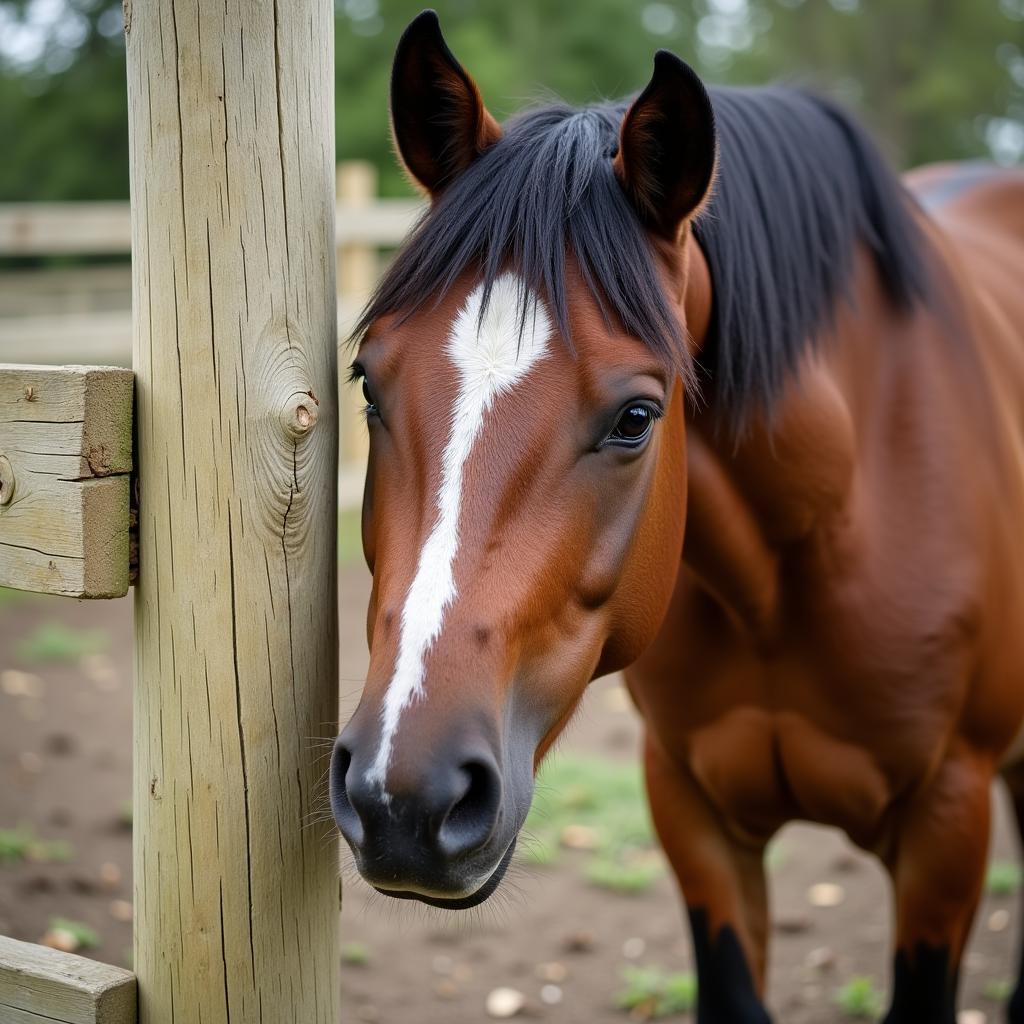Horse Licking can be a fascinating and sometimes puzzling behavior. From a gentle nuzzle to a full-blown slobber-fest, what exactly does it mean when your horse is licking you, another horse, or even inanimate objects? Understanding the reasons behind this behavior can deepen your bond with your equine companion and provide valuable insights into their world.
Why is My Horse Licking Me?
Horses communicate in a variety of ways, and licking is definitely one of them. When your horse licks you, it can indicate several things, from affection to seeking salt. Let’s explore some of the most common reasons:
- Affection and Bonding: Just like a dog licking its owner, a horse licking you can be a sign of affection and a way to strengthen the bond between you. They may lick your hand, arm, or even your face as a way of showing they appreciate your presence and care.
- Grooming and Social Interaction: Horses are social animals and engage in mutual grooming. Licking can be a part of this social interaction, a way of reinforcing their herd hierarchy and building relationships. If your horse licks you after you groom them, they might be returning the favor!
- Salt Seeking: Horses require salt in their diet, and if they’re lacking it, they may lick you in an attempt to find traces of salt on your skin, especially after sweating.
- Curiosity and Exploration: Horses use their mouths to explore their environment. Licking allows them to gather information about textures, tastes, and smells.
- Anxiety or Stress: In some cases, excessive licking can be a sign of stress or anxiety. If you notice your horse licking excessively, combined with other unusual behaviors, it’s important to consult a veterinarian to rule out any underlying medical or psychological issues.
Horse Licking Other Horses: A Sign of Social Dynamics
Observing horses licking each other can provide valuable insights into their social dynamics. Horses use licking to establish and maintain social bonds, often as part of mutual grooming. This behavior can reinforce their herd hierarchy and help them build strong relationships within the group.
- Mutual Grooming: Horses groom each other as a way of maintaining hygiene and building social connections. They often lick areas that are difficult for them to reach themselves, such as the withers and back.
- Submissive Behavior: A lower-ranking horse may lick a dominant horse as a sign of submission and appeasement. This behavior helps to maintain harmony within the herd.
- Maternal Bonding: Mares lick their foals extensively after birth to clean them, stimulate their circulation, and create a strong bond.
What About Horse Licking Objects?
Sometimes you might find your horse licking unusual objects, from fences and walls to trees and even their own stall. While this behavior might seem strange, it usually has a logical explanation:
- Mineral Deficiency: Licking inanimate objects can indicate a mineral deficiency. If your horse is consistently licking specific objects, it’s essential to have their diet evaluated by a veterinarian or equine nutritionist.
- Boredom and Stereotypical Behavior: In some cases, object licking can be a sign of boredom or a stereotypical behavior, especially in horses confined to stalls for extended periods. Providing [toy for horse] and ensuring adequate turnout can help alleviate this.
- Exploring Textures and Tastes: Similar to licking people, horses may lick objects out of curiosity, exploring different textures and tastes.
 Horse Licking a Fence Post
Horse Licking a Fence Post
Horse Licking: When to Be Concerned
While horse licking is typically a normal behavior, there are certain instances when it could indicate a problem:
- Excessive Licking: If your horse is licking excessively, to the point of causing hair loss or skin irritation, it could be a sign of a medical condition, such as allergies, or a psychological issue, like anxiety. This behavior may be accompanied by other signs, such as [blister stifles in horses]. It’s crucial to contact your veterinarian if you observe this.
- Changes in Behavior: If your horse suddenly starts licking objects or people more than usual, it could be a sign that something is amiss. Pay attention to any other changes in behavior, such as decreased appetite, lethargy, or aggression. Learning [how do horses communicate with humans] can help you identify potential problems early.
Conclusion
Understanding why your horse is licking can strengthen your bond and ensure their well-being. While licking is often a sign of affection, social interaction, or simple curiosity, it’s important to be aware of the potential underlying causes and seek professional advice when necessary. Horse licking can be a complex behavior, but by observing and understanding it, you can deepen your connection with your equine partner.
FAQ
- Is horse licking dangerous? Generally, horse licking is not dangerous, but excessive licking can lead to skin irritation or indicate an underlying problem.
- Why does my horse lick my clothes? They might be seeking salt, exploring textures, or simply enjoying your scent.
- How can I stop my horse from licking me? Try offering them a salt lick or distracting them with [grooming supplies for horses].
- Why does my horse lick the wall? This could indicate a mineral deficiency or boredom.
- Should I be worried if my horse is licking other horses excessively? It could be a sign of stress or a medical issue. Consult your veterinarian.
- Can horse licking be a learned behavior? Yes, horses can learn to lick for attention or rewards.
- What is the difference between horse licking and biting? Licking is generally a gentle behavior, while biting can be aggressive or defensive.
Need more help with your horse? Consider reading more about unusual behavior like [horse licking boobs].
For any concerns regarding your horse’s health or behavior, please contact us at Phone Number: 0772127271, Email: [email protected] or visit our location at QGM2+WX2, Vị Trung, Vị Thuỷ, Hậu Giang, Việt Nam. Our customer support team is available 24/7.